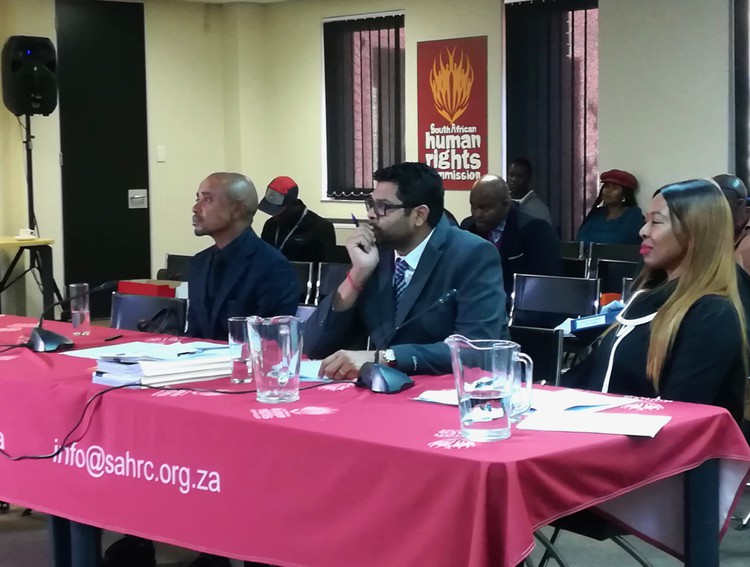
Staff from the Auditor General made submissions at the South African Human Rights Commission (SAHRC) and Public Protector’s inquiry into Alexandra township on Friday. Photo: Zoë Postman
27 July 2019
Scathing submissions by staff in the Auditor-General’s office revealed that the Alexandra Renewal Project (ARP) had poor record-keeping, which severely compromised its audit. For example, the original ARP business plan, for which the Gauteng Department of Human Settlements was responsible, is untraceable.
The main submission was made by Kavesh Lachman from the Auditor-General at the inquiry into Alexandra by the South African Human Rights Commission (SAHRC) and the Public Protector’s office on Friday. This was the last sitting of the inquiry.
The inquiry follows a spate of protests in Alexandra in April. Its purpose is to consider some of the issues raised by the protesters, which included overcrowding, housing, water and sanitation. It is also looking into allegations of corruption in the Alexandra Renewal Project (ARP) – a project initially worth R1.3 billion, launched in 2001 to develop Alexandra.
The audit, initiated in 2014, looked at four urban renewal plans in different areas in Gauteng, one of which was the ARP. The audit was not specifically focused on Alexandra but the report made “cross-cutting findings that were common under all four projects”.
The audit was intended to assess how all four renewal projects implemented electricity, water and sanitation, roads and stormwater, and housing and building activities in their respective areas.
But Lachman said the Auditor-General could only audit electrification and some building projects in Alexandra because it was unable to retrieve contracts, progress reports and variation orders.
“The original and approved business plans could not be provided by the Gauteng Department of Human Settlements. The auditors relied on individual business plans … that were made available by project teams,” said Lachman.
The absence of vital documents meant the Auditor-General could not confirm that the R1.3 billion budget (or the R2.2 billion expenditure) was exclusively used for this project. It concluded that the ARP had no project implementation system which was a result of poor project planning. The projects were not effectively implemented and monitored.
Vusi Dlamini, a panelist from the Public Protector’s office, asked what reasons were given by departments for not providing the necessary documents.
Lachman responded: “There were no reasons given for why they could not produce documents, they just said they could not find it or trace it.”
Mabatho Sedikela, also from the Auditor-General, said their concerns about poor record keeping were raised with the departments responsible for the ARP. The Auditor-General recommended that the departments re-assess business plans to align with the needs of communities, improve ARP monitoring, keep the community updated on progress, improve regional and provincial communication, establish a proper documentation and filing system, and improve progress reports.
Sedikela said the departments accepted the recommendations and committed to improving the ARP. But when a follow up was done in 2017, little progress was shown. “There were no efforts by government departments to provide additional information considering the lack of information in the first audit,” Sedikela told the panel.
Lachman said when a project is still ongoing, as the ARP was at the time of the audit, all documents are expected to be made available to the Auditor-General so that it can compare what the project was intended to be with what it had achieved.
When a project was completed, government departments were expected to keep the documents for at least seven years after the completion, Lachman said.
The inquiry has ended. The SAHRC and Public Protector will compile a report with recommendations on how to improve Alexandra.